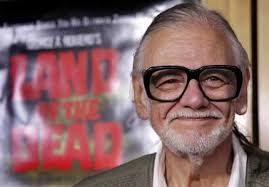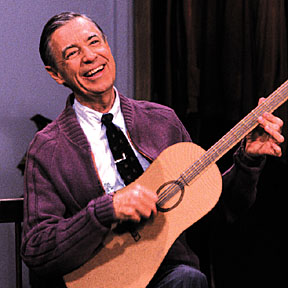 |
| This guy loves Romero movies. You're about to find out why. |
In 1968, George Romero released the modern horror classic,
Night of the Living Dead. The low budget creeper invented a horror sub-genre, the cannabilistic zombie thriller, and coincidentally dismantled tropes concerning race in horror films.
 |
Romero's rules! Believe it or not, this guy got his start as a production assistant on Mr. Roger's Neighborhood.
|
Zombies are big business now.
The Walking Dead,
World War Z,
Resident Evil--the list continues almost ad nauseum. However, the original
Night contains the most insightful and bold commentary on society and race yet.
Check out this recent article (10/1/13 via NPR) on Romero's revolutionary film and daring casting decisions:



Zombie stories have always been interesting in that they provide a view into another world, a “what if” scenario played out in front of us. They give humans a threat that cannot be handled and plays it out for the audience, who are safe from a distance, to see how the humans react, and that’s what makes it so intriguing, like NPR says, because there are different reactions from different people, and we tend to connect to certain ones in particular.
ReplyDeleteSo, I think I agree in this article in that the idea that the protagonists of those works are black makes the film more interesting and stronger than they would have been (as the author makes a point of regarding NotLD and The Walking Dead). I still need to play The Walking Dead video game (Episode 1 is free on PSN! Awesome!), but I’ve heard it’s really good, narrative-wise. I do agree that while Lee’s race doesn’t necessarily affect his character, it does add to the “societal echoes” the author speaks of, the point being that race does affect interaction, both in the works of NotLD and The Walking Dead, and in our world.
We have preconceived notions regarding certain races or cultures, like with stereotypes – Asians are good at math, or all Blacks are good at sports, for example - and we tend to put these notions onto others of that particular sort; whether they are actually representative of these notions or the traits that we push onto them is a separate issue. By making these characters into those races and making their personalities different from one would connect to these stereotypes, we are challenging the audience’s preconceptions of these types of people. Like the article mentioned, Lee Everett and Ben could have been any race, but because they are black, it addresses both the characteristics that people would associate with that race and helps to eliminate both these kinds of stereotypes that make us believe people are something that they really aren’t, and those “arbitrary racial boundaries [that] can create real societal divides” the author refers to.
Let me know what the game is like, Kenny, so that I can live vicariously through you.
ReplyDeleteWill do, Mr. Clark!
DeleteI beat the game, Mr. Clark. I think I'm done.
Delete